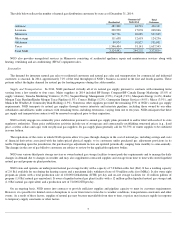CenterPoint Energy 2014 Annual Report Download - page 21
Download and view the complete annual report
Please find page 21 of the 2014 CenterPoint Energy annual report below. You can navigate through the pages in the report by either clicking on the pages listed below, or by using the keyword search tool below to find specific information within the annual report.
could increase our costs to repair damaged facilities and restore service to our customers. When we cannot deliver electricity or natural gas to
customers, or our customers cannot receive our services, our financial results can be impacted by lost revenues, and we generally must seek
approval from regulators to recover restoration costs. To the extent we are unable to recover those costs, or if higher rates resulting from our
recovery of such costs result in reduced demand for our services, our future financial results may be adversely impacted.
Air Emissions
Our operations and the operations of Enable are subject to the federal Clean Air Act and comparable state laws and regulations. These laws
and regulations regulate emissions of air pollutants from various industrial sources, including processing plants and compressor stations, and also
impose various monitoring and reporting requirements. Such laws and regulations may require pre-
approval for the construction or modification
of certain projects or facilities expected to produce air emissions or result in the increase of existing air emissions. We may be required to obtain
and strictly comply with air permits containing various emissions and operational limitations, or utilize specific emission control technologies to
limit emissions. Failure to comply with these requirements could result in monetary penalties, injunctions, conditions or restrictions on
operations, and potentially criminal enforcement actions. We may be required to incur certain capital expenditures in the future for air pollution
control equipment in connection with obtaining and maintaining operating permits and approvals for air emissions.
The EPA continues to adopt amendments to its regulations regarding maximum achievable control technology for stationary internal
combustion engines (sometimes referred to as the RICE MACT rule), the most recent being January 14, 2013. On August 29, 2013, the EPA
announced that it was reconsidering three issues related to the RICE MACT rule, but on August 15, 2014, the EPA determined that it would not
propose any changes to the regulations at this time. Compressors and back up electrical generators used by our Natural Gas Distribution
segment, and back up electrical generators used by our Electric Transmission & Distribution segment, are generally compliant with existing
regulations.
In addition, on August 16, 2012, the EPA published final rules that establish new air emission control requirements for natural gas and NGL
production, processing and transportation activities, including New Source Performance Standards to address emissions of sulfur dioxide and
volatile organic compounds, and National Emission Standards for Hazardous Air Pollutants (NESHAPS) to address hazardous air pollutants
frequently associated with gas production and processing activities. The finalized regulations establish specific new requirements for emissions
from compressors, controllers, dehydrators, storage tanks, gas processing plants and certain other equipment. The final rules under NESHAPS
include maximum achievable control technology standards for “small”
glycol dehydrators that are located at major sources of hazardous air
pollutants and modifications to the leak detection standards for valves. Compliance with such rules is not expected to result in significant costs
that would adversely impact our results of operations.
Water Discharges
Our operations and the operations of Enable are subject to the Federal Water Pollution Control Act of 1972, as amended, also known as the
Clean Water Act, and analogous state laws and regulations. These laws and regulations impose detailed requirements and strict controls
regarding the discharge of pollutants into waters of the United States. The unpermitted discharge of pollutants, including discharges resulting
from a spill or leak incident, is prohibited. The Clean Water Act and regulations implemented thereunder also prohibit discharges of dredged and
fill material in wetlands and other waters of the United States unless authorized by an appropriately issued permit. Any unpermitted release of
petroleum or other pollutants from our pipelines or facilities could result in fines or penalties as well as significant remedial obligations.
Hazardous Waste
Our operations and the operations of Enable generate wastes, including some hazardous wastes, that are subject to the federal Resource
Conservation and Recovery Act (RCRA), and comparable state laws, which impose detailed requirements for the handling, storage, treatment,
transport and disposal of hazardous and solid waste. RCRA currently exempts many natural gas gathering and field processing wastes from
classification as hazardous waste. Specifically, RCRA excludes from the definition of hazardous waste waters produced and other wastes
associated with the exploration, development or production of crude oil and natural gas. However, these oil and gas exploration and production
wastes are still regulated under state law and the less stringent non-
hazardous waste requirements of RCRA. Moreover, ordinary industrial
wastes such as paint wastes, waste solvents, laboratory wastes and waste compressor oils may be regulated as hazardous waste. The
transportation of natural gas in pipelines may also generate some hazardous wastes that would be subject to RCRA or comparable state law
requirements.
15
























